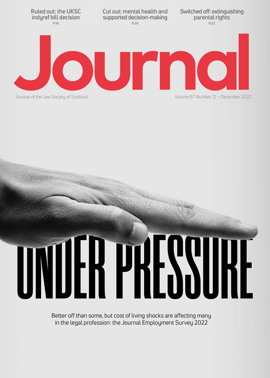Property: Conveyancing – the future is in our hands

There has been much commentary recently about the “next big thing” which will revolutionise and digitise the practice of conveyancing. Such innovation in our industry is to be welcomed.
This article looks at the role which conveyancers have in shaping their own future with appropriate external input.
Where are we now?
It is widely recognised that the everyday life of a conveyancer has changed dramatically as a result of the pandemic. There has been pressure from all sides and work levels have been sky high. We have experienced significant change, much of which has been for the better. There have been major developments in digital identity, sales protocols, digital registration, secure digital signatures, and other initiatives which are designed to make the home moving process more efficient for clients and practitioners alike. Of course there are still issues to be improved, but the “change genie” is out of the bottle and will not be going back inside.
We are at a crossroads of sorts. Faced with a choice in such circumstances, it is suggested that the only decision is to go forward and embrace those initiatives which are complementary to everyday practice and help influence that change. At the same time, we have to be wary of changes which may seem to be favourable but which, on closer examination, may result in conveyancers being less involved in the home moving process.
It has to be acknowledged that our conveyancing systems have been developed over a long period of time and generally have served us and society well. Can they be improved? Absolutely.
What is coming down the line?
There are a number of developments coming down the line which will make the home moving process more efficient.
Vendor disclosure. For those selling, or contemplating the sale of, their property now, they could be completing their property information questionnaires, ordering searches and title documents, and their conveyancer could be checking them over to get everything into shipshape condition so that when a buyer is found, legal commitment could follow very quickly. It’s not that any of these things take a long time to gather, but it is conflicting information during the conveyancing process and the lack of any consistency of information that generates additional costly enquiries, especially when information is gathered piecemeal over a period of time.
If all the information is available upfront, you avoid additional enquiries and also post-valuation queries, because the valuer has the right information when they are inspecting the property. English local searches are on average ordered four to eight weeks after the memorandum of sale, on average take 10 days to come back and, where they result in a post-valuation query, these on average take three weeks to be settled. However, if the information is available at the point of sale and the valuer can see the information at the point of valuation, we can eradicate a minimum of five weeks’ delay.
A vendor disclosure system is operated in Denmark, Norway and certain other jurisdictions to good effect and all the information is gathered at listing. Fall-throughs are so low that in some areas they do not even record them, and where they do it’s less than 2%. But it is also worth noting that in those countries, exchange of contracts can happen within as little as six working days. If only that were the case here.
But we don’t just have to look to other jurisdictions to see the impact. Every year, 22,000 properties are sold at auction. The legal pack means that the contract is made instantly on the coming down of the hammer. Data from an auction pack portal indicate that for the 200,000 properties which were added to the portal, 1 million people registered to view the pack and 22 million documents were downloaded. This demonstrates that prospective purchasers want to see salient information before lodging a bid.
Why would we not want to see a positive, proactive change to improve the home moving process in this way? Is it really an option that we just carry on as we did before?
There is no reason why we cannot change the way in which we process conveyancing transactions. That entails us taking an objective assessment of the timetable as it applied pre-COVID-19 in light of IT and other developments, and seeing what can be improved.
Funds transfer. Another much-talked about concept is focused on how to improve the transfer of funds to all relevant parties at completion of a transaction. We have seen how this is done in Australia. There have, however, been a number of other related developments in this space in recent years and there is a choice of solutions available which should be examined. The various solutions are different, but have the same general aim of saving time and money and seeking to reduce the risk of cyber fraud. In some cases, however, we would do well to think about what the effect might be on the role of the conveyancer going forward. Do we really want to be in a situation where control of the future of the conveyancing process lies in the hands of a third party with no history or empathy with how we do business?
Digital transfer. This in many respects is related to funds transfer. The UK Land Registries have made huge progress in their digital transformation programmes. The final digital solution however will require to be developed as a result of a collaborative process with conveyancers and the broader industry. Land Registries have statutory obligations and, by necessity, they have to be careful. This is where conveyancers can be of assistance so that what is designed accords with conveyancing practice and not some external view of what it might be or what exists in another jurisdiction.
HMLR and Registers of Scotland are the de facto electronic lodging authorities, and they will develop their own regulatory frameworks to facilitate what is loosely called e-conveyancing in the UK as their part of the digital revolution. They are the secure platforms on which business will be transacted and to which case management systems can connect. Indeed, there is no reason why we cannot see digital identity and AML/VOI generally being incorporated therein and then shared on a trusted basis. There is no need for any other “satellite” platform to sit alongside our long-established and trusted public registries if case management systems can connect to these. Put simply, the long-established title registration process works; there is no need for anyone other than the Land Registries to take the lead on the changes required to introduce a fully automated digital process, and we should support them in their endeavours.
In Australia, change was urgently required to a system that was largely paper-based and reliant on cheques being exchanged in settlement rooms. That has not been the position in the UK for years now, so a wholesale “like for like” comparison cannot, and should not, be made with a jurisdiction which is fundamentally different from those in the UK. That is not to say that we cannot learn from the Australian and any other comparative jurisdiction, however. We just need to be selective and ensure that we are in control of our own destiny.
So what needs to happen?
In the “new normal”, as referred to by our politicians following the pandemic, consumers are less likely to accept an answer from their adviser that “This is the way it has always been done.” COVID-19 was a gamechanger, and society has been changed in many ways. The consumers of legal services are now data hungry and expect to be able to have access to their information and transactions in which they are involved. That is as it should be; even a digital settlement and registration system will only save time when buying a property if it is preceded by upfront information, available digitally, to the consumer and stakeholders.
It is time, however, for conveyancers to stand up and be counted and lead from the front. This is what happened in Denmark, with considerable success: see www.danskeboligadvokater.dk. As in Denmark, conveyancers in the UK can shape their own future on the journey towards an “end to end” digital basis. When looking at proposed innovative changes we just need to remember the old adage, “All that glitters is not necessarily gold.”
Find out more
Both authors are participants in the Home Buying & Selling Group (Beth Rudolf is co-chair) – homebuyingandsellinggroup.co.uk
The views expressed in this article are the personal views of the authors.
Perspectives
Features
Briefings
- Criminal court: Farewell retrospective
- Agriculture: A future support framework
- Corporate: Is there a creditor duty?
- Intellectual property: "Reclaiming the UK statute book"
- Sport: Flouting their own rules?
- Succession: Crofting tenancy transfers in intestacy
- Scottish Solicitors' Discipline Tribunal: December 2022
- Property: Conveyancing – the future is in our hands
- In-house: With a fair wind







